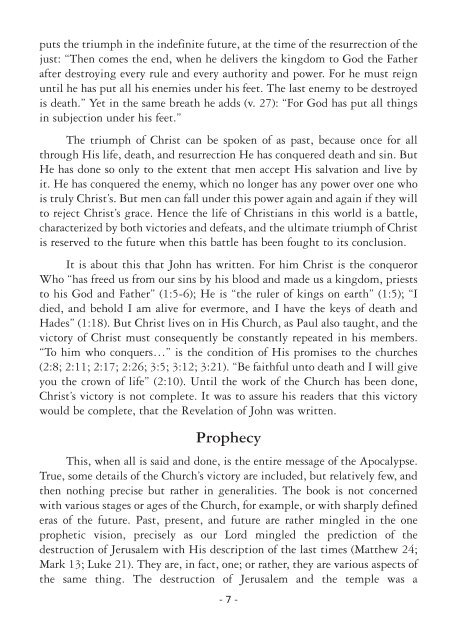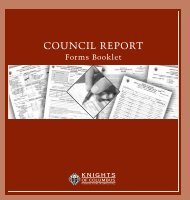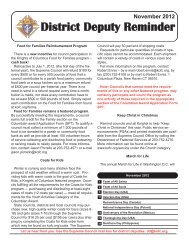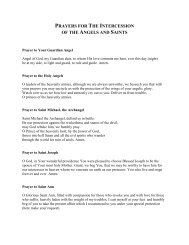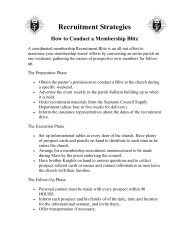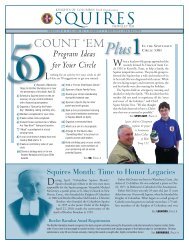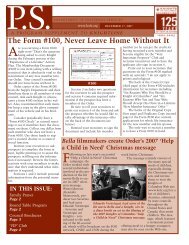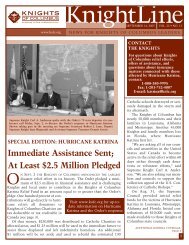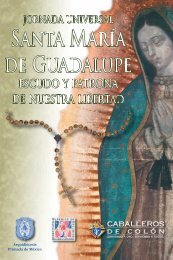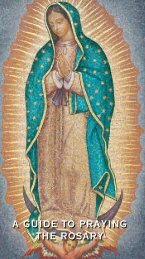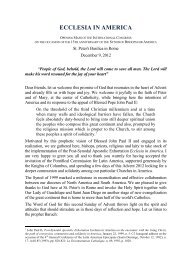Revelation: - Knights of Columbus, Supreme Council
Revelation: - Knights of Columbus, Supreme Council
Revelation: - Knights of Columbus, Supreme Council
You also want an ePaper? Increase the reach of your titles
YUMPU automatically turns print PDFs into web optimized ePapers that Google loves.
puts the triumph in the indefinite future, at the time <strong>of</strong> the resurrec tion <strong>of</strong> the<br />
just: “Then comes the end, when he delivers the kingdom to God the Father<br />
after destroying every rule and every authority and power. For he must reign<br />
until he has put all his enemies under his feet. The last enemy to be destroyed<br />
is death.” Yet in the same breath he adds (v. 27): “For God has put all things<br />
in subjection under his feet.”<br />
The triumph <strong>of</strong> Christ can be spoken <strong>of</strong> as past, because once for all<br />
through His life, death, and resurrection He has conquered death and sin. But<br />
He has done so only to the extent that men accept His salvation and live by<br />
it. He has con quered the enemy, which no longer has any power over one who<br />
is truly Christ’s. But men can fall under this power again and again if they will<br />
to reject Christ’s grace. Hence the life <strong>of</strong> Christians in this world is a battle,<br />
characterized by both victories and defeats, and the ulti mate triumph <strong>of</strong> Christ<br />
is reserved to the future when this battle has been fought to its conclusion.<br />
It is about this that John has written. For him Christ is the conqueror<br />
Who “has freed us from our sins by his blood and made us a kingdom, priests<br />
to his God and Father” (1:5-6); He is “the ruler <strong>of</strong> kings on earth” (1:5); “I<br />
died, and be hold I am alive for evermore, and I have the keys <strong>of</strong> death and<br />
Hades” (1:18). But Christ lives on in His Church, as Paul also taught, and the<br />
victory <strong>of</strong> Christ must consequently be constantly repeated in his members.<br />
“To him who conquers…” is the condition <strong>of</strong> His promises to the churches<br />
(2:8; 2:11; 2:17; 2:26; 3:5; 3:12; 3:21). “Be faithful unto death and I will give<br />
you the crown <strong>of</strong> life” (2:10). Until the work <strong>of</strong> the Church has been done,<br />
Christ’s victory is not complete. It was to assure his readers that this victory<br />
would be complete, that the Revela tion <strong>of</strong> John was written.<br />
Prophecy<br />
This, when all is said and done, is the entire message <strong>of</strong> the Apoca lypse.<br />
True, some details <strong>of</strong> the Church’s victory are included, but relatively few, and<br />
then nothing precise but rather in generalities. The book is not concerned<br />
with various stages or ages <strong>of</strong> the Church, for example, or with sharply defined<br />
eras <strong>of</strong> the future. Past, present, and future are rather mingled in the one<br />
prophetic vision, precisely as our Lord mingled the prediction <strong>of</strong> the<br />
destruction <strong>of</strong> Jerusalem with His description <strong>of</strong> the last times (Matthew 24;<br />
Mark 13; Luke 21). They are, in fact, one; or rather, they are various aspects <strong>of</strong><br />
the same thing. The destruction <strong>of</strong> Jerusalem and the temple was a<br />
- 7 -


